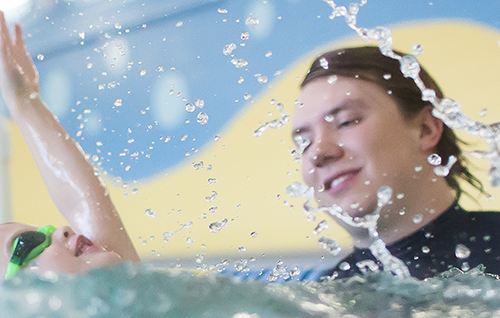Teaching swimming classes for special needs kids can be uniquely rewarding. Just ask D’Ar Zirbes, a Site Director at Foss Swim School who has instructed numerous kids with a range of developmental and physical challenges.
D’Ar said the most important thing a parent of a special needs child can do is be transparent about what their child needs. By talking through the child’s situation, parents and instructor can come up with a plan. “It doesn’t always have to be private lessons,” said D’Ar. “It can be finding a smaller class, or a quieter time at the pool. And sometimes we will do one-on-one lessons outside of class time.”
Swimming lessons for an autistic child
Parents of kids on the autism spectrum are used to making adaptations, but even so figuring out how to teach an autistic child to swim can be a challenge. A pool can present many unfamiliar sensory experiences, so helping a child with autism swim means learning to adapt. But when kids on the autism spectrum in swimming lessons become comfortable with and even start to enjoy the experience, it’s like watching a lightbulb go on.
“Kids with autism are sensitive to sound and getting water in their eyes and ears. Getting used to your ears filling with water – that’s a strange sensation,” D’Ar said. “But then they figure out it’s really quiet under the water, and some kids really like that!”
Swimming lesson plans for a range of special needs
Swimming lessons for kids with Down’s syndrome, physical disabilities or neurological diseases such as epilepsy will need to adapt in different ways. D’Ar estimates he’s worked one on one with about 25 kids with some form of disability, and is one of many teachers within the FOSS system to do so.
For kids with physical disabilities, swimming may be a significant part of their exercise since it isn’t jarring and offers body support; for many kids with developmental disabilities, swimming might primarily be about fun. In all cases, there is an emphasis on safety and knowing how to be safe in and around water, just as there is with any child.
“I worked with one boy who was non-verbal and autistic,” said D’Ar. “He had no fear of the water and was really strong. It was very dangerous. But by the end of the classes, he could swim the length of the pool and roll on his back.”
Special needs swim lessons require specialized teaching skills
FOSS makes training available for instructors who want to work with special needs kids, and also has a relationship with the Shriner’s hospital, working with kids who have had amputations. “Every child is different,” said D’Ar. The special training covers a lot of key topics, and “you learn a lot more just from working with kids.”
Ultimately, D’Ar hopes the parents of special needs children understand that what seems like a daunting challenge most often turns out to be a positive experience for everyone: the parents, who get greater peace of mind and can see their kids progressing; the children, who develop valuable skills and have a lot of fun doing so; and even the instructors, who find great satisfaction in the work.
“You have to know when to push enough and when to take a break,” said D’Ar, speaking of working with the kids. “But in the end, whatever they want, they will eventually get to it.”
